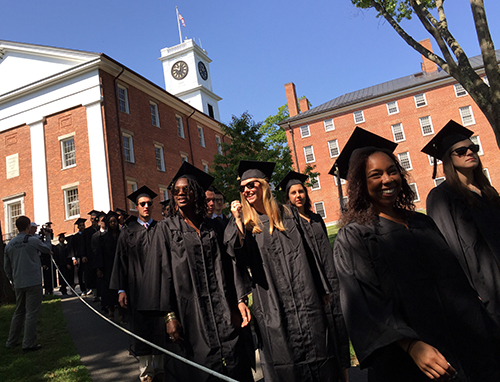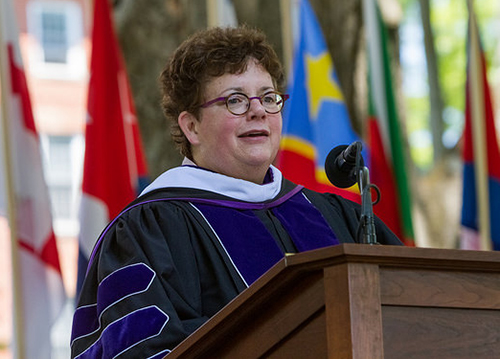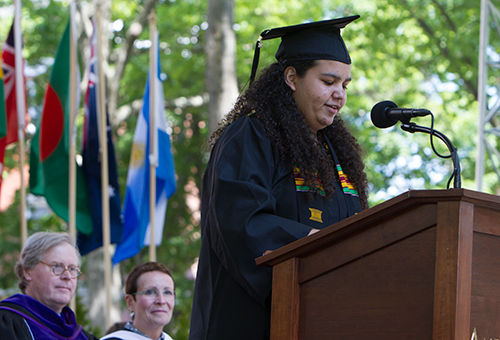May 24, 2015

The members of the class of 2015 process to their seats
AMHERST, Mass. — Under cloudless blue skies today, Amherst College President Biddy Martin urged the 470 members of the class of 2015 to follow the example of famous alumnus and legal activist Charles Hamilton Houston and restore faith in our society’s institutions by remaking them. “Take your talents, your energy and your humane hearts and do your best to combine right meaning with deeds,” she said. “And while you are at it, cherish your families, your friends and, most of all, yourselves.”
Martin’s address followed a talk by Katherine C. Ponds, of Arlington, Va., who was chosen by her classmates to deliver the traditional student speech during the College’s 194th Commencement this morning.
An estimated 5,000 enthusiastic family members and friends gathered to hear Martin and Ponds speak and see the students receive their bachelor’s degrees. The ceremony also featured the awarding of honorary doctorates to six distinguished guests and capped a weekend of lectures, concerts and other festivities. (Check out photos of the festivities at the College’s Flickr site and audio of talks given by the honorees on the Commencement page.)

Amherst President Biddy Martin speaks to the graduates
Martin began her speech by remembering her first encounter with the class of 2015. She described the students’ accomplishments, future plans and the incredible diversity of their backgrounds. Briefly touching on a speech a former Amherst president made a century ago, she noticed some of the many differences between the world today and 100 years ago.
“Amherst graduates have been important players in the changes that have occurred” since 1915, she said, citing Houston, a member of that year’s graduating class, as a prime example. The first African American student to speak at the College’s Commencement and a renowned attorney, Houston is widely recognized as the legal architect of the modern civil rights movement and the “engineer” of the Brown v. Board of Education court case that abolished the racial segregation of public schools.
She wondered whether change of the kind Houston envisioned and helped create is possible in today’s world. “If we are to ‘let American be America again,’ to invoke Langston Hughes, you will have to put your remarkable intelligence to work,” she told the graduates. “You will have to develop well-informed points of view; you will have to acquire breadth not only of knowledge, but of perspective. You will have to find ways to engage others. And to all of those things you need to add grit, self-awareness, and respect for others, even adversaries.”
“Remember that the Houstons of our world did not leave institutions as they found them; [their] work helped [make our] institutions more capable of making good on their promise,” she continued. “To restore faith in our institutions, to restore faith in America … we need you to get out there and change them, in order to preserve them. And I know you will.”
Before reciting A.R. Ammons’ poem “Salute,” Martin left the graduates with some final thoughts: “Don’t sell intellectual work short. Don’t let a fauxpopulism on the left or the right obscure the importance of what you have learned to do here—think critically, deeply, creatively, with joy in your own intellectual and artistic feats …. Take your talents, your energy, and your humane hearts and do your best to combine right meaning with deeds. And, while you are at it, cherish your families, your friends and, most of all, yourselves.”
“Perhaps even these things will one day be pleasing to remember”

Katherine Ponds ’15 delivers the traditional student Commencement address
Prior to Martin’s remarks, the graduates heard from Ponds, who also referenced Houston and the 100th anniversary of his Commencement speech. “As an African American myself, a black studies major, a former chair of the Black Student Union, but mostly just as a proud member of the Amherst College community as a whole, I am deeply humbled by this,” she said.
Ponds, also a classics major, briefly recounted the story of the Trojan hero Aeneas, who “sailed far and wide on a treacherous yet wondrous journey to fulfill his destiny and become the founder of Rome.” During one of the many challenges in his life he faced, Ponds said, “Aeneas stood up and urged his men forsan et haec olim meminisse iuvabit, which means in English, ‘Perhaps even these things will one day be pleasing to remember.’”
Ponds said she often tried to invoke these words in her own dark hours at Amherst and recounted a humorous story about a night she spent hiding in the Keefe Campus Center working on an unfinished project. “We’re now graduating from Amherst College and those short moments that I spent pressed and mangled in the darkness of [Keefe] seem ridiculous, comical, even trivial in the long run. But most importantly, [they are] pleasing to remember.”
“We are all connected and bound to one another because in these formative years every last one of us became who we’ve become and bore witness to the same transformation within others, whether we knew it at the time or not,” she concluded. “And in the years to come, as we go on to found our own little metaphorical Romes, we’ll hold fast to these memories of Amherst, knowing that, for better or for worse, they’ve shaped us. And we’ll take comfort in the knowledge that our peers will do the same.”
Honorary awards and other prizes
In addition to the awarding of bachelor of arts degrees to the assembled graduates, honorary doctorates were presented to six special guests: entrepreneur and philanthropist Jim Ansara ’82, renowned children’s book author and illustrator Eric Carle, contemporary artist and educator Sonya Clark ’89, economist Alice Rivlin, computational geneticist Pardis Sabeti and attorney and activist Paul Smith ’76.
Other honorees included Leo Arnaboldi ’81, P ’14, P’ 17 who was awarded the 2015 Medal for Eminent Service for exceptional and distinguished service to the college for a great period of time. Teachers Bob Jonas, a math instructor at Carnegie Vanguard High School in Houston, Texas; Linda Maier,a biology teacher from Emma Willard School in Troy, N.Y.; and Steve Schmidt,a history instructor from Lowell High School in San Francisco, Calif., were honored with Phebe and Zephaniah Swift Moore Awards after being nominated by graduating seniors whom they had taught in high school. Sean M. Clancy ’78, P ’15 served as the honorary marshal for the ceremonies.
The Obed Finch Slingerland Memorial Prize, given by the trustees of the college to members of the senior class who have shown by their own determination and accomplishment the greatest appreciation of and desire for a college education, was awarded to Samanta Alana English of Brooklyn, N.Y.
The Woods-Travis Prize, an annual gift in memory of Josiah B. Woods and Charles B. Travis of the Class of 1864, was awarded for outstanding excellence in culture and faithfulness to duty as a scholar. It went this year to Eileen Lucía Troconis Gonzalez of Merida, Venezuela.
For more photos, audio and text of speeches, go to the Amherst College website the week of May 25.
###